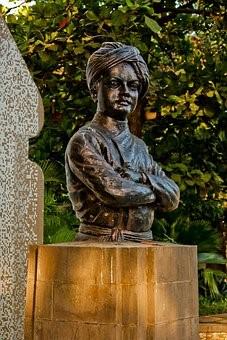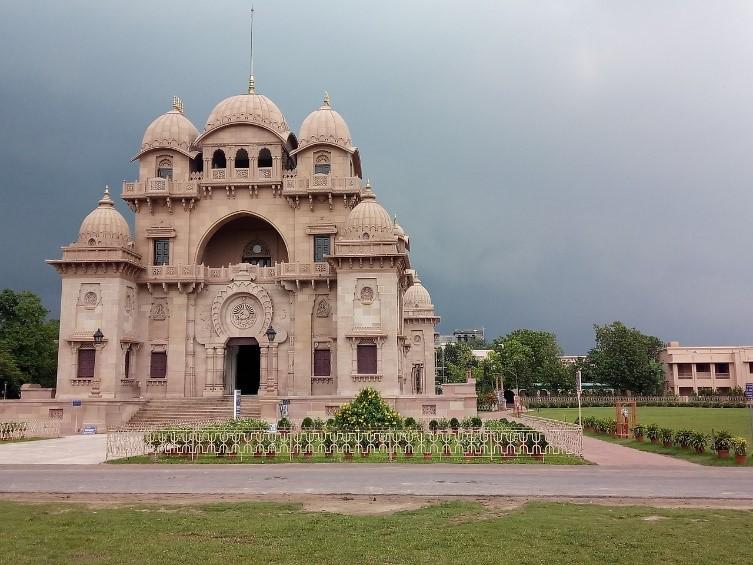Originally known as Narendranath Datta, Vivekananda (January 12, 1863 —July 4, 1902) was an Indian Hindu spiritual leader and reformer who sought to unite Eastern spirituality with Western technological advancement, contending that the two complemented and augmented one another. He believed that one’s aim was to achieve an individual’s higher self and working for the good of humanity was the highest goal.
He was raised in a Kayastha upper-middle-class Bengali family and had his education at a university in the Western academic tradition, where he was exposed to Western philosophy, science, and Christianity. Vivekananda’s ideas on social reform began to take center stage, and he joined the Brahmo Samaj (Society of Brahma), a group committed to ending child marriage and illiteracy as well as promoting education for women and members of lower castes. Later, he rose to prominence as Ramakrishna’s most illustrious disciple, proving the fundamental similarity of all religions.

Vivekananda tried to inject vigor into Hindu thought, placing less emphasis on the prevalent pacifism, and presenting Hindu spirituality to the West. He did this by consistently emphasizing the universal and humanistic side of the Vedas, the oldest sacred texts of Hinduism, as well as the belief in service rather than dogma. He served as a catalyst for the effort in the United States and England to further Vedanta philosophy, one of the six schools of Indian philosophy.
Vivekananda’s invitation to the Chicago conference was the result of a long and difficult journey. He had been working hard to spread the teachings of his guru, Ramakrishna Paramahamsa, and to promote understanding and harmony between people of different religions and backgrounds. He had traveled extensively in India, giving lectures and inspiring people with his wisdom and insights.
In the late 1880s, Vivekananda began to consider the possibility of traveling to the United States to share his message with a wider audience. He was encouraged to do so by some of his followers, who believed that he had an important message to share with the world. However, he faced many challenges and obstacles in his efforts to secure an invitation to the conference.
One of the most significant instances of criticisms that Swami Vivekananda faced was when he tried to establish a monastery in the United States. Even though he had gained a large following in the country he struggled to find support for his monastic plans. Many people did not believe that a young Indian monk could succeed in establishing a monastery in the United States, and they were skeptical of his ability to attract and retain followers.
Despite these challenges, Vivekananda persevered and eventually succeeded in obtaining an invitation to the conference. He traveled to the United States in 1893 and delivered a series of powerful and inspiring lectures at the conference. As a part of the World’s Columbian Exposition, the Permanent Memorial Art Palace, today known as the Art Institute of Chicago, hosted the World’s Parliament of Religions beginning on September 11, 1893. On that day, Vivekananda delivered his inaugural lecture. After considerable waiting, his turn finally arrived in the afternoon. He was first apprehensive, but after bowing to Saraswati, the Hindu goddess of learning, he felt a new energy come into his body; he felt as though “The Soul of India, the echo of the Rishis, the voice of Ramakrishna, the mouthpiece of the resurrected Time spirit” had occupied his body. “Sisters and brothers of America!” was the salutation he used to begin his address.
Vivekananda made an effort to elucidate the causes of conflict between many sects and religions in this address. He related the tale of a frog, popularly known as (koop mandook). And in the tale, he told, a frog once called a well home. It was born there, raised there, and used to believe that his well was the largest body of water on earth. A frog from a sea visited the well one day. The well-dwelling frog did not trust the sea frog’s claim that the sea is far larger than his well and chased the sea frog away from his well. This tale was recounted by Swami Vivekananda to illuminate the reasons why it is impossible for humans to coexist in harmony in this planet. We as humans are incapable of settling such minor conflicts, which breeds hatred and division.
Vivekananda talked on the meaning of the Hindu faith and provided a brief overview of Hinduism. He also discussed the survival of the three oldest religions in the world—Hinduism, Zoroastrianism, and Judaism—as well as the rise of Christianity. He continued by discussing the Hindu philosophy of Vedanta and the ideas of God, soul, and body.
Vivekananda concluded– ” That has been the difficulty all the while. I am a Hindu. I am sitting in my own little well and thinking that the whole world is my little well. The Christian sits in his little well and thinks the whole world is his well. The Muslim sits in his little well and thinks that is the whole world.” His words were well-received by the audience, and he gained a large following in the United States as a result of his participation in the conference. So, he made it to the Chicago conference through his determination and hard work.
At the monastery of Belur Math on the Ganges River close to Calcutta, Vivekananda started the Ramakrishna Mission upon his return to India in 1897 with a small number of Western disciples. His values were self-improvement and service, which the order continued to emphasise. Even though he only lived for two years of the 20th century, he made the highest ideals of the Vedantic faith relevant to it and left his mark on both the East and the West.

Figure 2. Source – Needpix.com. An image of the Belur Math established by Swami Vivekananda.
Despite these challenges, Swami Vivekananda persevered and eventually succeeded in establishing the Ramakrishna Order in the United States. He worked tirelessly to spread the teachings of his guru, Ramakrishna Paramahamsa, and to promote understanding and harmony between people of different religions and backgrounds. He traveled extensively, giving lectures and inspiring people with his wisdom and insights.
In the face of rejection and criticism, Swami Vivekananda remained resolute and committed to his spiritual path. He understood that the path to enlightenment was not always easy and that he would face many challenges along the way. However, he also knew that by staying true to his beliefs and continuing to strive for spiritual growth, he would eventually be able to overcome any obstacle that came his way. His message of love, compassion, and understanding continues to resonate with people around the world, and his legacy lives on as a testament to the power of faith and determination.





